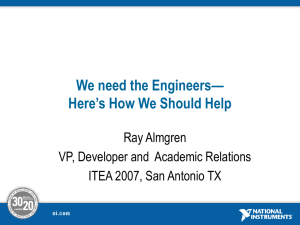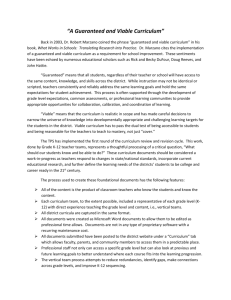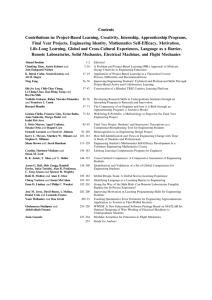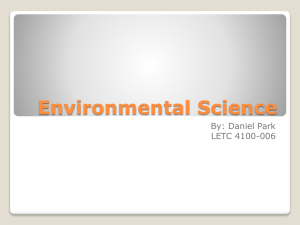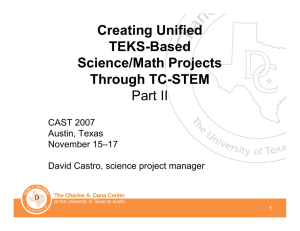Supporting Unified TEKS-Based Science/Math Projects Through TC-STEM
advertisement
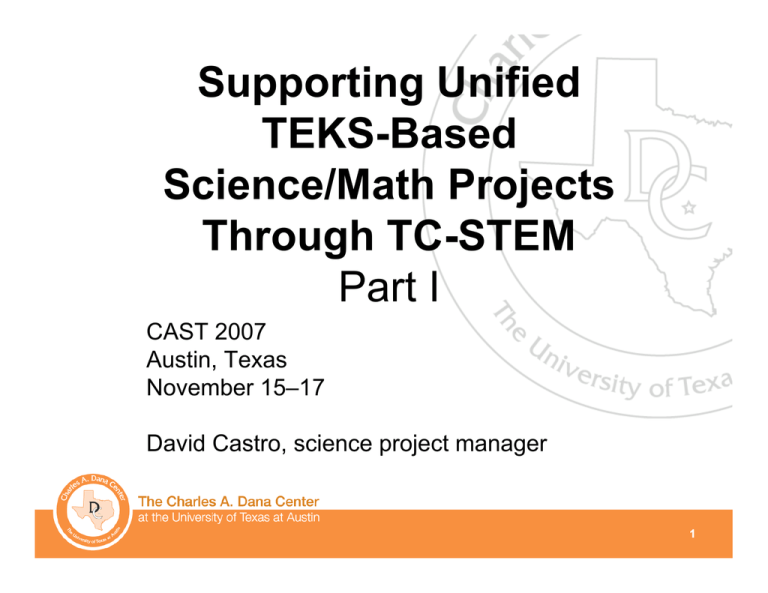
Supporting Unified TEKS-Based Science/Math Projects Through TC-STEM Part I CAST 2007 Austin, Texas November 15–17 David Castro, science project manager 1 About the Dana Center Established during the early 1990s in the College of Natural Sciences at The University of Texas at Austin to support equity in mathematics and science education. Coordinated the development of the mathematics and science Texas Essential Knowledge and Skills. Worked long-term with over 200 school districts to support systemic change. Became a Texas Center for STEM (TC-STEM) in 2006. Provides ongoing research as well as support materials and professional development for teachers and leaders. 2 Session Objectives Discuss the advantages and challenges of implementing TEKS-based math/science projects. Define the characteristics of a successful T-STEM academy. Outline the structures needed to support STEM-focused math/science projects. 3 Why use project-based learning? When implemented successfully, it connects to the “real world.” increases student engagement. develops problem-solving skills. promotes transfer of knowledge. builds expert understanding. is more effective in supporting the TEKS than traditional instruction. creates productive citizens. 4 Project Planning Protocol (P3) Day Science 1 Introduce New Content 2 Reflect 3 Gather Data Math 4 Analyze Data 5 Model Data 6 Create Design Proposal 7 Refine Design Proposal 8 Conduct Experiment 9 Analyze Analyze 10 Present Present 5 The Alignment Issue 6 Project-based learning must be supported by an effective instructional program. 7 Indicators of an effective instructional program powerful rigorous TEKS-based integrated project-based aligned career-centered engaging data-driven innovative holistic relevant student-centered research-based authentic coherent 8 Most educators would agree that all these words describe elements of an effective instructional program. powerful rigorous TEKS-based integrated project-based aligned career-centered engaging data-driven innovative holistic relevant student-centered research-based authentic coherent Most educators would NOT agree on the meaning of these words! 9 Characteristics of a Successful T-STEM Academy The Dana Center Perspective 10 A Successful T-STEM Academy: promotes interest in Science, Technology, Engineering, and Mathematics (STEM). provides open access to all. embraces the small-school model. provides a rich problem-solving environment. produces college-ready graduates. 11 A Successful T-STEM Academy: strongly supports implementation of the TEKS. deliberately and methodically builds student skills. promotes expert-level understanding of core content. supports teacher collaboration and professionalism. provides a guaranteed and viable curriculum. creates structures for supporting and implementing interdisciplinary project-based learning. 12 A Successful T-STEM Academy: strongly supports implementation of the TEKS. deliberately and methodically builds student skills. promotes expert-level understanding of core content. supports teacher collaboration and professionalism. provides a guaranteed and viable curriculum. creates structures for supporting and implementing interdisciplinary project-based learning. 13 12th 11th 10th Core Curriculum Core Curriculum Core Curriculum Core Curriculum TAKS Enrichment Engineering T-STEM Academy Parallel Strands Model College 9th 14 Parallel Strands Model Successes Easy to implement – – – – Scheduling Curriculum Resources Partners Increased student interest Increased community interest Challenges Limited impact on core curriculum Limited support for struggling students No assurance of college success TAKS, TAKS, TAKS 15 T-STEM Academy Integrated Model College TAKS 12th 11th S T E M 10th 9th 16 Integrated Model Successes Whole-school effort Deliberate skill-building Multiple opportunities for reinforcement Unity of purpose Guaranteed outcomes Challenges Collaboration Systemic change Vertical alignment Horizontal alignment Long-term planning TIME, TIME, TIME 17 A Successful T-STEM Academy: strongly supports implementation of the TEKS. deliberately and methodically builds student skills. promotes expert-level understanding of core content. supports teacher collaboration and professionalism. provides a guaranteed and viable curriculum. creates structures for supporting and implementing interdisciplinary project-based learning. 18 The Need for Vertical Articulation “Learning Line” diagram is taken from Robert J. Marzano, Debra J. Pickering, & Jane E. Pollock. (2001). Classroom Instruction that Works. Alexandria, VA: Association for Supervision and Curriculum Development, page 67. 19 The TEKS Process Skills: Grades 6–8 20 Vertically Articulated Process Skills: Grades 6–8 21 The Curriculum Collaboration Form 22 A Successful T-STEM Academy: strongly supports implementation of the TEKS. deliberately and methodically builds student skills. promotes expert-level understanding of core content. supports teacher collaboration and professionalism. provides a guaranteed and viable curriculum. creates structures for supporting and implementing interdisciplinary project-based learning. 23 Experts Versus Novices Novices solve by procedure. Experts solve by principle. Expert thinking can be taught! – – – – Confront preconceptions. Carefully scaffold activities. Emphasize metacognition. Develop robust schema. Expert thinking transfers! Adapted from Champagne, A. B., Gunstone, R. F., & Klopfer, L. E. (1982). A perspective on the differences between expert and novice performance in solving physics problems.Research in Science Education, 12(1), 71–77. 24 A Successful T-STEM Academy: strongly supports implementation of the TEKS. deliberately and methodically builds student skills. promotes expert-level understanding of core content. supports teacher collaboration and professionalism. provides a guaranteed and viable curriculum. creates structures for supporting and implementing interdisciplinary project-based learning. 25 Professional Learning Communities Successes Teaching for learning Shared pedagogy Mutual support Empowerment Clear expectations Self-regulation Institutional memory Challenges Structured collaboration – Time – Money – Expert facilitation Cultural change – Teachers – Students – Parents Monitoring Support 26 A Successful T-STEM Academy: strongly supports implementation of the TEKS. deliberately and methodically builds student skills. promotes expert-level understanding of core content. supports teacher collaboration and professionalism. provides a guaranteed and viable curriculum. creates structures for supporting and implementing interdisciplinary project-based learning. 27 An effective curriculum must be both guaranteed and viable. Guaranteed Common understanding of the TEKS Clear student expectations Operational definition of learning outcomes Mutual accountability Viable Essential content can be taught by all teachers to all students in the available instructional time. 28 Density: Operational Versus Procedural Understanding 56% correct statewide 31% correct statewide 40% answered B 29 A Successful T-STEM Academy: strongly supports implementation of the TEKS. deliberately and methodically builds student skills. promotes expert-level understanding of core content. supports teacher collaboration and professionalism. provides a guaranteed and viable curriculum. creates structures for supporting and implementing interdisciplinary project-based learning. 30 The Project Planning Protocol 31 Supporting the Project Planning Protocol To successfully implement math/science projects, teachers must have . . . a guaranteed and viable curriculum. a common curricular vision. strong content knowledge. access to research-based pedagogy. a protocol for effective lesson design. commitment, high expectations, and accountability. leadership support. 32 Contact Information David Castro, science project manager davidcastro@mail.utexas.edu www.sciencetekstoolkit.org www.utdanacenter.org 33

